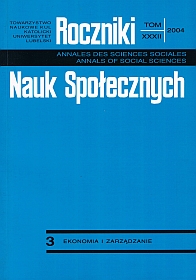Benchmarking as Learning from the Best Ones
Abstract
The article is devoted to a discussion of one of the modern techniques of management, i.e. benchmarking. It contains a choice of definitions of this method formulated by authors of dissertations as well as by people actually working in economy, and stresses common features that occur in them, which constitute the essence of benchmarking. It also contains a classification of various kinds of this technique, based on various criteria mentioned in the literature, and a discussion of various types of benchmarking (inner, competitive, general, strategic benchmarking, as well as benchmarking of results of action and processes). The article also stresses the conditions for applying this method that determine its effectiveness for the organization. There are also examples of methodology of benchmarking application formulated – like the definitions – both by researchers and by economic practitioners from the organizations working in economy.
References
Brilman J. (2002), Nowoczesne koncepcje i metody zarządzania, Warszawa: PWE.
Czekaj J. (1995), Benchmarking – metoda racjonalizacji organizacji, „Ekonomika iOrganizacja Przedsiębiorstw”, 9, 5-8.
Czekaj J., Dziedzic D., Kafel T., Martyniak Z. (1996), Benchmarking – nowe metody doskonalenia organizacji, „Organizacja i Kierowanie”, 1, 39-49.
Kącik Menedżera (1997), „Ekonomika i Organizacja Przedsiębiorstw”, 12, 26-27.
Penc-Pietrzak I. (1998), Analiza SWOT i wizja. Metody i narzędzia formułowania strategii przedsiębiorstwa, „Manager”, 1, 20-24.
Penc-Pietrzak I. (2000), Równać do najlepszych, „Manager”, 2, 38-41.
Urbaniak M. (1999), Benchmarking – sztuka kopiowania, „Manager”, 1, 20-22.
Węgrzyn A. (2000), Benchmarking, Wrocław: Wydawnictwo Antykwa.
Copyright (c) 2004 Roczniki Nauk Społecznych

This work is licensed under a Creative Commons Attribution-NonCommercial-NoDerivatives 4.0 International License.


